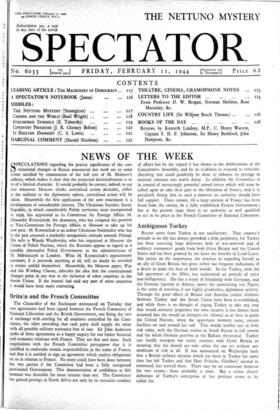Britain and the French Committee
The Chancellor of the Exchequer announced on Tuesday that two agreements had been signed between the French Committee of National Liberation and the British Government, one fixing the rate of exchange with .sterling for all countries controlled by the Com- mittee, the other providing that each party shall supply the other with all possible military assistance free of cost. Sir John Anderson spoke of these agreements as a happy augury for our future financial and economic relations with France. They are that and more. Such negotiations with the French Committee presuppose that it is qualified to undertake certain responsibilities in the name of France, and that it is entitled to sign an agreement which confers obligations on us in relation to France. No more could have been done between the two parties if the Committee had been a fully recognised provisional Government. This demonstration of confidence at this moment was desirable for more reasons than one. The Committee has gained prestige in North Africa not only by its executive conduct
of affairs but by the regard it has shown to the deliberations of the Consultative Assembly, and by its readiness to respond to criticism. Anything that could prudently be done to enhance its prestige in external relations was worth doing. In addition the Committee is in control of increasingly powerful armed forces which will soon be called upon to take their part in the liberation of France, and it is peculiarly fitting that at such a moment its authority should have full support. There cannot, till a large portion of France has been freed from the enemy, be a fully established French Government ; but at the present stage there is no authority so well qualified to act in its place as the French Committee of National. Liberation.


























